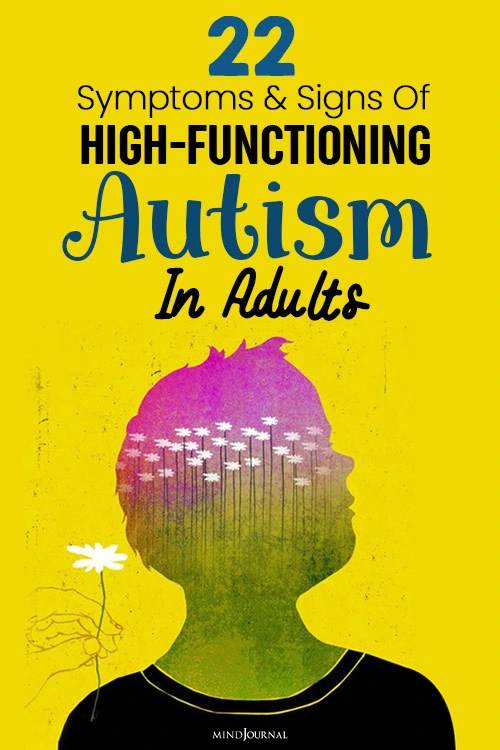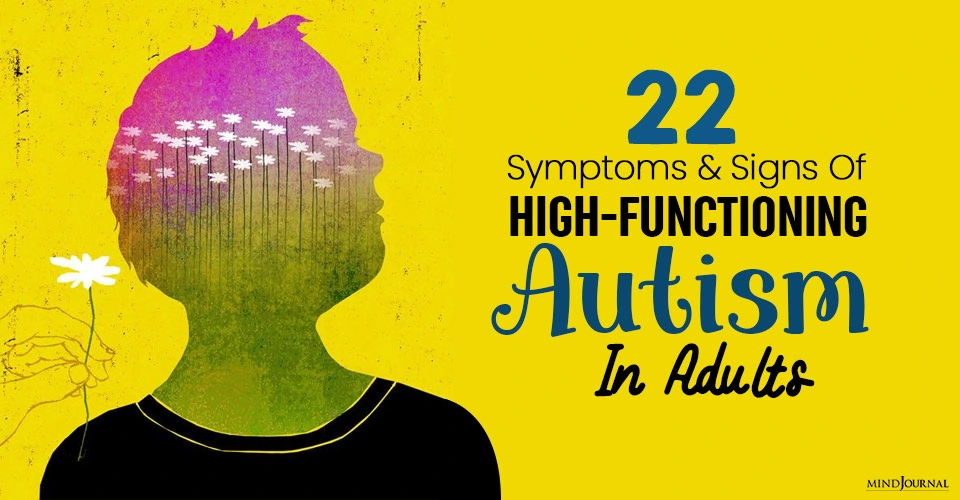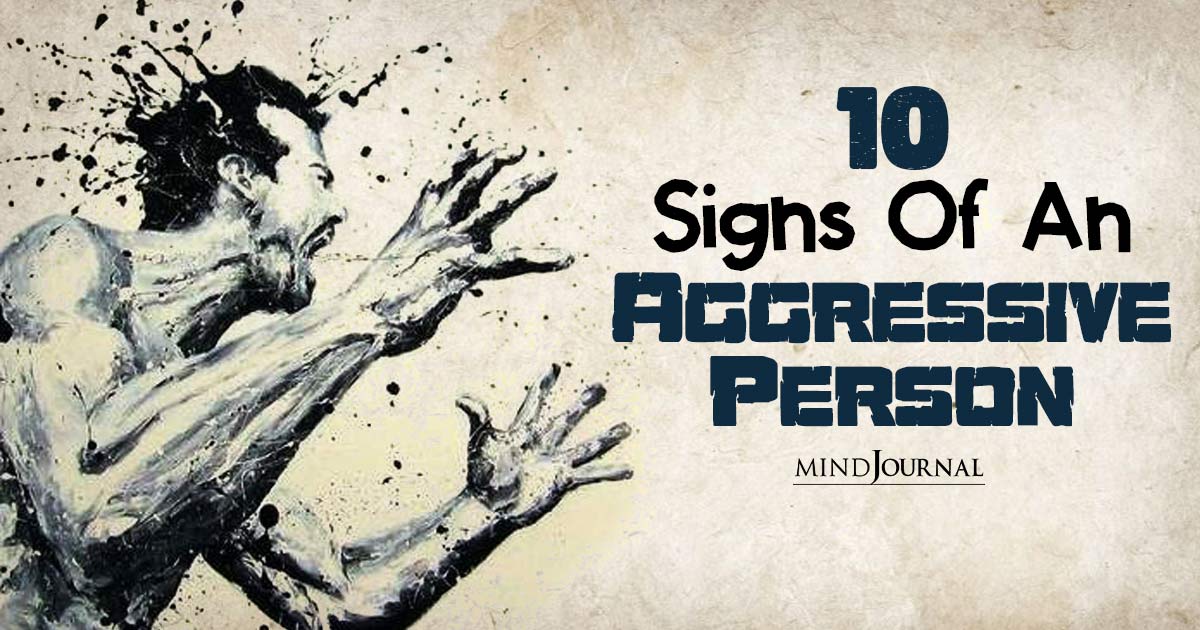High functioning autism is not actually an official medical diagnosis, nor is it an official medical term. This term is mostly used when talking about autism or autism spectrum disorder in general. Contrary to what most people think, this is not just found in children, signs of high-functioning autism in adults is also quite common.
Autism Spectrum Disorder (ASD) can be found in all ages, races, genders, ethnic groups, racial groups, and socioeconomic groups. Autism is generally characterized by communication and social challenges, and repetitive behaviors.
Related: The Relationship Between ADHD and ASD
What Does High Functioning Autism In Adults Mean?
It depends. If someone falls in Level 1 of ASD, then they are considered to be high functioning. However, sometimes it might be that someone’s behavioral attitudes might be Level 2, and their social capabilities turn out to be Level 1.
There are several factors that lead to an autistic person being labeled as high functioning, and some of the factors are as follows:
- How they communicate with others.
- How well they’re doing at their jobs and whether they are being able to sustain it or not.
- How they handle themselves in social situations.
- How they build and maintain their personal relationships.
- How they try to mask or hide their autistic traits.
The bottom line is that the better a person is able to mingle in a neurotypical society, the higher functioning they will be. Due to this reason alone, many autistic people don’t get diagnosed until quite later in their lives.
22 Signs Of High-Functioning Autism In Adults
For the most part, autism is diagnosed in small children when they are toddlers. But if you are an adult, here are the symptoms of high-functioning autism in adults:
Behavioral and emotional signs
- You display repetitive behaviors and mannerisms.
- You get ticked off when things are rearranged or moved from their ‘rightful place’.
- You tend to speak or make noises where you’re supposed to be quiet.
- You have a emotional outburst or breakdown whenever something unfortunate or unexpected happens.
- You follow a strict and rigid routine everyday, and refuse to budge from it.
- You find it hard to deal with your emotions and respond in unhealthy ways more often than not.
- You react very badly if you have to make any sort of changes in your routine.
Communication difficulties
- You find it challenging to understand social cues.
- You struggle at building and sustaining friendships.
- You feel intimidated at making eye contact while speaking to someone.
- You talk a lot about a few specific topics that are close to your heart.
- You find it hard to understand idioms and sarcasm.
- You struggle with understanding facial expressions and body language.
- You find it challenging to hold a conversation for a long time.
- You prefer solitude most of the time, compared to socializing.
- You speak in a flat, robotic and monotonous way, which makes it hard for other people to understand what you’re saying.
- You speak in the same tone with everyone, be it your friends, family, colleagues and even strangers.
Other signs of high functioning autism
- You consider yourself to be clumsy who has a hard time with coordination.
- You are often regarded as quirky and eccentric.
- You are hypersensitive to sensory input like pain, sound, light, touch or smell.
- You are extremely intelligent and knowledgeable about certain specific interests of yours, such as, mathematics, history, books, politics, sports etc.
- You want to do things for yourself most of the time, instead of for others.
These are some of the most common traits of high functioning autism in adults, and being aware of these signs can help you understand all of this better.
Related: 23 Alarming Red Flags Of Sensory Issues In Kids That Most Parents Miss
How To Diagnose High Functioning Autism In Adults?
The ideal way of diagnosing autism is by going to a psychologist who has specialized training in Autism Spectrum Disorder (ASD), and who will give you a thorough and specialized evaluation. Some of the most common methods of diagnosing autism are as follows:
1. The Autism Spectrum Rating Scale (ASRS)
ASRS optimizes observational data from parents, guardians, and teachers to deduce whether the concerned individual fulfills the diagnostic criteria for autism. This scale is normally used for individuals falling in the age group of one and a half and 18 years old.
2. The Autism Diagnostic Interview, Revised (ADI-R)
ADI-R is a thorough interview that aims towards evaluating, and assessing high autism symptoms in children aged 4 years and older.
3. The Autism Diagnostic Observation Schedule (ADOS)
ADOS is regarded as the best method or tool for diagnosing high functioning autism symptoms in adults. It involves a standardized assessment of a child’s imaginative abilities and plays, and a person’s social interactions to deduce whether they meet the diagnostic criteria for autism spectrum disorder.
Even though there are certain sections that are designed to diagnose autism in children, these can also be used in evaluating signs of high-functioning autism in adults.
Related: This Poem Written By A Boy With Autism Will Make You Feel Emotional
Treatment Of High Functioning Autism In Adults
Adults suffering from high autism symptoms are normally not taken as seriously as autistic children are, nor do they always get the support they need to deal with this. High functioning autistic adults can be treated effectively with the help of applied behavioral therapy, verbal therapy, and cognitive therapy.
Additionally, you can seek out the appropriate treatment for yourself based on high functioning autism symptoms you exhibit, e.g., career issues, relationship problems, anxiety, social phobia, emotional meltdowns, etc.
Here are a few more options that might help you deal with this in a more effective way:
1. Vocational rehabilitation.
Vocational rehabilitation can help you tremendously with challenges and obstacles you are facing in your career due to high autism symptoms. It can help you explore more options such as further studies, job changes and even volunteering opportunities.
Many autistic people tend to have a hard time in their workplaces if there’s too much noise, sound, bright lights, long commutes, and overwhelming stress. Employers can put in more effort to make their workplaces more neurodiverse so that autistic people can work to their fullest potential and thrive.
2. Educating yourself about autism.
The more you educate yourself about autism, the better you will be able to cope with it. Moreover, your loved ones will also know what to do to help you feel better. Learning more about your condition will help you understand it better.
It can help you feel more secure. confident, and validated, and drive you towards finding the right tools that will work for you.
Related: Can Autistic People Make Great Social Partners?
3. Getting in touch with fellow autistic people.
Socializing and interacting with other autistic people can help you feel less isolated from others because they are in the same boat as you. Maybe you can go to a support group, or opt for online forums and chat groups. Mingling with other autistic people can expose you to more resources and can also help you understand yourself better.
4. Therapy
Therapy and counseling can help you a lot if you are showing signs and symptoms of high functioning autism in adults. Therapists can guide you through the entire thing, and help you explore various kinds of therapies including cognitive-behavioral therapy (CBT).
Therapy can help you deal with your anxiety, rigid and inflexible thinking, social isolation, and personal challenges that you might be experiencing in your life.
Related: Is It Still Gaslighting If My Partner Has Asperger’s?
Bottomline
For adults who show high functioning autism symptoms, getting diagnosed can bring about a huge amount of relief, clarity, and understanding. You can also utilize many resources that can help you deal with this condition in a much healthier and better way.
If you suspect that you might have high functioning autism, the best thing to do is to get in touch with a psychologist, get tested, and follow the right treatment plan.
Frequently Asked Questions (FAQs)
Do I have high functioning autism?
If you display signs such as having a hard time with social interactions, having a rigid daily routine, not doing well with changes, finding it difficult to make and sustain friendships and too much social interaction causes you to shut down, then chances are you have high functioning autism.
Can someone with autism have a normal child?
Of course, yes. Autistic people can have normal children as long as they are ready, willing, and have the right skills to parent them.
What are the signs of autism in female adults?
Some of the major signs of autism in women are not responding to their names, finding it hard to listen or look at someone, blank or inappropriate facial expressions, the constant urge for being alone, and feeling uncomfortable with any form of physical touch.









Leave a Reply
You must be logged in to post a comment.